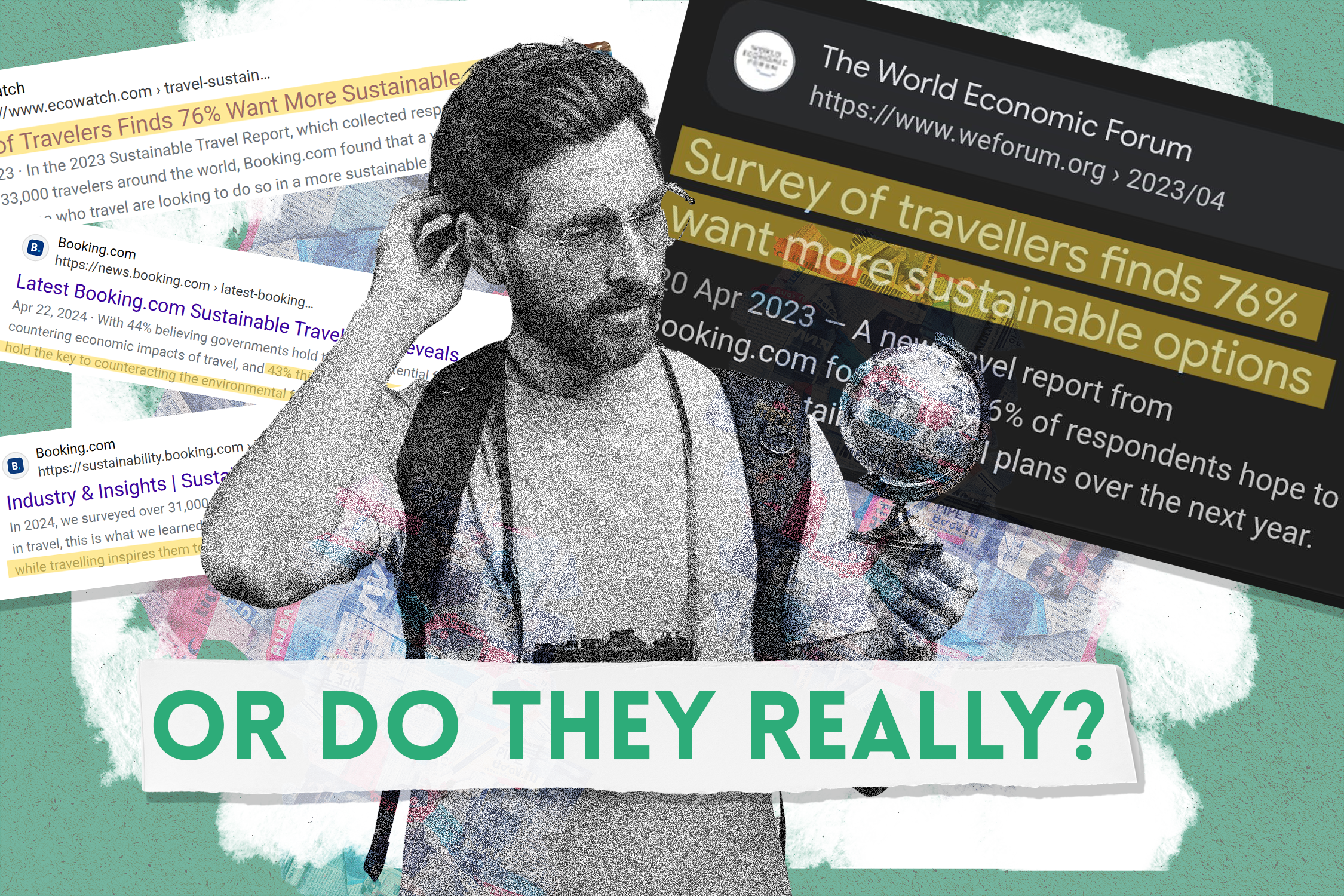The statistics of well-known agencies about conscious travelers prioritizing sustainability when booking hotels do not reflect reality.
Reports from agencies like Booking.com and TripAdvisor claim that 60% to 71% of travelers prioritize sustainability when choosing accommodations (Global Sustainable Tourism Council, 2020; Booking.com, 2023). Although these figures propose a significant move towards eco-conscious travel, my extensive experience paints a different picture.
With over 15 years in the travel industry, where I've closed numerous deals and conducted substantial business with people from various walks of life, I am not too thrilled to say this: not once has a client inquired about the conservation efforts, eco-friendly practices, or sustainability policies of the hotels we've booked for them. Not a single time!
We specialize in creating tailor-made luxury travel packages, and we've worked with a diverse clientele: business people, IT professionals, HR executives (some of whom are meticulous about including their pronouns in their names), middle and top managers, and even presidents and managing directors of top companies.
Regardless of their positions or awareness levels, the discussions always boil down to three key points: the hotel's star rating, the cost, and the location. Sustainability is seldom a part of the conversation. Even when we raised the topic of a hotel's sustainable practices as one of the key points in pitching a custom travel plan to our clients, the final selection still came down to the same three factors: cost, star category, and location.
When agencies claim that over 50% of travelers are conscious about sustainability and base their accommodation choices on it, it's misleading at best. While sustainability makes for great panel discussions and clap talks, the reality is pretty paradoxical. In my experience, not one traveler has planned their trip or chosen accommodations with even 10-15% consideration for sustainability.
This discrepancy raises important questions about the authenticity of widely reported statistics. Are these figures reflective of actual consumer behavior, or are they inflated by a marketing campaign riding the sustainability wave, thus creating a bigger sustainable tourism bubble? While sustainability is a popular topic in society, its integration into real-world travel decisions appears limited.
To get a reality check, ask yourself: how many trips have you planned, and how many included a discussion with your travel planner about selecting a sustainable hotel? How many times have you specifically chosen a hotel because of its sustainability practices?
Now, take your answer—whether it's never, rarely, or occasionally—and reflect on how likely that answer could be the same for people around you. Multiply this by the average traveler, and you'll see a pattern emerge. The chances are that the numbers claimed by agencies, like "over 50% of travelers prioritize sustainability," don't hold up.
Maybe the sample size of these surveys is too narrow, targeting a specific audience that doesn't represent regular travelers. Or perhaps the respondents say what sounds good rather than what they actually practice. Whatever the case, when you consider the realities of decision-making in travel, the claimed statistics often feel inflated and detached from the experiences of most people.
It may largely be this way because many customers feel their individual effort is like finding a needle in a haystack. There's a sense of futility, a belief that one person's choices won't create any tangible impact. Without visible global momentum or widespread change, they think, "Why bother?"
This mindset further compounds the problem. The lack of quantifiable progress in sustainability initiatives discourages people from taking personal responsibility, creating a vicious cycle. Until collective action becomes evident and individuals see their efforts contributing to a broader, impactful movement, sustainability will remain an afterthought rather than a priority.
Sustainability, in this context, becomes more of a concept—aspirational rather than actionable.
Bridging the Gap Between Perception and Practice
While my firsthand experience suggests a lower prioritization of sustainability, the broader context cannot be overlooked. The reported increase in the search for sustainable travel options—a 191% rise from 2020 to 2023—indicates growing awareness and interest in eco-friendly practices. However, awareness does not always equate to action. Several factors might contribute to this gap:
- Travelers may express interest in sustainability, but there is a limited availability of verified sustainable stays.
- Without clear, verified information about a hotel's sustainability efforts, travelers may find incorporating these factors into their decision-making process challenging.
- Even if travelers are aware of sustainability, they might not perceive the immediate benefits outweigh the costs, especially when prioritizing luxury and convenience.
Reevaluating Sustainable Practices in Hospitality
The hospitality industry collectively has a responsibility, as 21% of the ecological footprint is generated by global tourism. As growth is forecasted for the industry, it has become very important for them to reduce their CO2 emissions by 66% per room by 2030 and 90% per room by 2050.
And an enormous responsibility to initiate change lies with the hotels themselves. They must lead the way in educating their guests about sustainability. This could start with visible displays, orientations, or interactive sessions within the hotel premises. Hotels must showcase what they are doing, how they are implementing sustainable practices, and—most importantly—where the guests' money is going when sustainability is highlighted as a selling point. Transparency is key.
Guests need to see tangible results. Labeling a stay "green" has no merit unless it demonstrates measurable impact through water conservation programs, renewable energy use, or community support initiatives. When people understand the value of these efforts, they are far more likely to embrace and demand such practices in the future.
For instance, imagine a hotel that openly shares its sustainability roadmap: how it sources materials, minimizes waste, or reinvests profits into environmental projects. Guests leave with a memorable stay and a sense of contribution. This newfound awareness plants a seed. On their next trip, these guests might seek similar initiatives, and if they don't find them, they might challenge the status quo. Slowly but surely, this creates a ripple effect, encouraging more properties to follow suit.
The idea is to train guests to think sustainably—not through guilt or obligation, but by engaging them in meaningful ways. When sustainability becomes part of the guest experience, it stops being abstract and starts feeling personal.
And for those who are committed, how do you select sustainability-certified hotels?
Favor companies with official accreditation. But which seals of approval carry weight amid the sea of accreditations out there?
Look for certifications demonstrating action and progress.
Green Key, sustainability certification program is operated by the world's largest environmental organization, the Foundation for Environmental Education (FEE).
The Green Key has been awarded to over 3,000 establishments in 65 countries to help individuals organize travel.
EarthCheck and Green Globe indicate a client meets exceptional standards of practice.
BREEAM (Building Research Establishment Environmental Assessment Method) and LEED (Leadership in Energy and Environmental Design) signal construction meets green building principles. However, this doesn't represent how ethical they are as employers. B Corp is a paid-for certification that means a business has been assessed on how much they ponder the impact of every decision on their team, customers, suppliers, community, and the environment.
Booking.com announced the Travel Sustainable Badge to create "a credible, globally relevant sustainability measure" available to properties that implement a combination of sustainable practices that meet a threshold for their destinations. This badge will make finding sustainable hotels easier for eco-friendly travel. At the same time, Expedia offers its Green Hotels program to help travelers organize travel.
.png)







